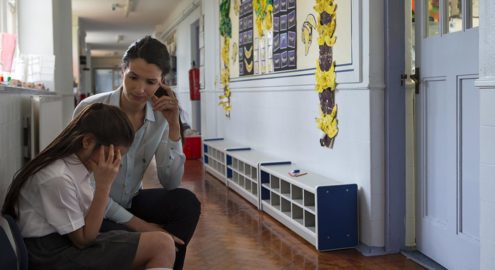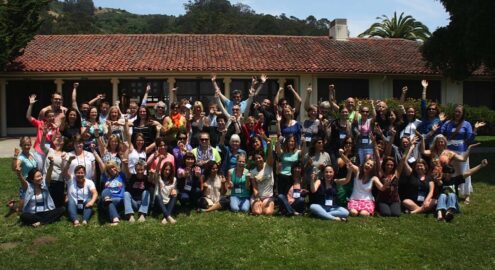What Are They?
According to the Collaborative for Academic, Social, and Emotional, Learning (CASEL), social-emotional learning (SEL) is “the process through which children and adults understand and manage emotions, set and achieve positive goals, feel and show empathy for others, establish and maintain positive relationships, and make responsible decisions.”
Self-awareness and self-management are two of the five components that make up CASEL’s model of SEL.
Self-Awareness is simply the ability to be aware of one’s inner life—one’s emotions, thoughts, behaviors, values, preferences, goals, strengths, challenges, attitudes, mindsets, and so forth—and how these elements impact behavior and choices.
A new teacher who is self-aware notices his fearful emotional response on his first day of teaching. He feels his heart beat faster and his stomach clench as he worries about making a good first impression on students. He wants to run out the door before the students enter the classroom, but then recognizes that this behavior is a result of his emotions and thoughts running amok, and he accepts that these reactions can occur when he experiences anxiety.
Skills that develop self-awareness include:
- Labeling and recognizing one’s emotions
- Identifying what triggers own emotions
- Analyzing emotions and how they affect others
- Understanding the relationship between one’s emotions, thoughts, and behaviors
- Recognizing one’s needs, values, judgments, and biases
- Identifying personal strengths and areas for growth
- Practicing self-compassion
- Cultivating self-confidence, positive self-regard, a “growth” mindset, and optimism
Self-management is the ability to navigate and shift one’s thoughts, emotions, and behaviors in a healthy way in order to make decisions and reach goals that benefit oneself and others.
A new teacher who was anxious about her first year of teaching remembered learning from her mentor that when she felt the terror of facing her students for the first time, she could change how she felt by thinking differently about the situation. So, instead of dreading her new profession, this teacher decided to look at it as an adventure—one that might bring her supportive colleagues, wonderful students, and exciting opportunities.
Self-management skills include:
- Regulating and expressing one’s emotions thoughtfully
- Demonstrating perseverance and resilience to overcome obstacles
- Sustaining healthy boundaries
- Applying strategies to reduce personal and interpersonal stress
- Setting and monitoring short-term and long-term goals
- Advocating for oneself and one’s needs
- Maintaining attention
- Using feedback constructively
Ultimately, self-awareness and self-management are closely linked. For example, being able to stop and calm down when one is upset (self-management), requires skills like recognizing and labeling the emotions that one is feeling and considering how they might be affecting one’s behavior choices (self-awareness).
For a deeper dive into the science and practical school-based examples of this science in action, click on the following topics:
SEL for Adults: The Basics of Emotion
SEL for Adults: Emotions and Culture
SEL for Adults: Emotion Regulation
Why Are They Important?
Teaching and school leadership are demanding jobs, to say the least. Yet research shows that cultivating social and emotional skills can help lessen burnout and turnover and increase job satisfaction in both teachers and principals. In addition, these skills can also help improve relationships with students, leading to higher academic achievement.
More specifically, several components of self-awareness and self-management can lead to the following outcomes:
Teachers who cultivate their emotional literacy, skills, and knowledge have more positive relationships with students.
- Intentionally developing educators’ emotional intelligence through training can shift teachers’ beliefs about how often to engage one-on-one with students, support them emotionally, and show concern for them outside the classroom.
- The positive emotions that often result from emotional skills motivate teachers to create strong relationships with students in the first place.
Teachers become better teachers when trained in emotional skills.
- Learning how to recognize, understand, label, and manage emotions improves educators’ ability to maintain an efficient and goal-oriented classroom.
- Emotional skills also help teachers to better scaffold student learning, offer their students helpful feedback, and provide them with a sense of accomplishment.
Emotional knowledge improves teachers’ experience of the job itself.
- Knowing how to relate to their emotions effectively increases teachers’ level of energy and their resilience when faced with challenges. They are also more engaged in their work, focusing much of their attention and effort on the task of teaching.
Managing emotions in a healthy way improves educators’ well-being.
- Teachers who are able to regulate their emotions enjoy greater job satisfaction and personal accomplishment, in addition to better support from their principals. However, the method they choose matters. Adults who use emotion regulation techniques such as “reappraisal”—or changing how you think or feel about a situation—rather than suppression show higher levels of life satisfaction and well-being, and less depression. (Note that emotion regulation strategies and outcomes vary by culture.)
Being there emotionally for students really matters.
- Research shows that both academic outcomes and behavior improve when students feel emotionally supported by their teachers.
- Students are more engaged in school when they experience an emotionally secure relationship with their teachers.
Teachers who are kind to themselves on difficult days fare better.
- Self-compassion has been linked to greater well-being, better relationships, and increased resilience. Indeed, practicing self-compassion may help educators to foster a positive classroom environment and to cultivate supportive relationships with students who challenge them.
Growing teachers’ awareness of their implicit biases is imperative to student success.
- Research suggests that black students are more likely to receive harsher discipline than white students due to teachers’ unconscious partiality to white students–and this bias might be just as likely to come from a black teacher as a white one.
Teachers who increase their awareness of the expectations they hold for students may make a profound difference in students’ lives.
- Studies show that when teachers hold high expectations, students are more likely to succeed academically, graduate from high school, and attend college, particularly if they come from ethnically and/or economically disadvantaged backgrounds.
- Research suggests that teachers should examine their preconceived beliefs around gender, ethnicity, and socio-economic factors, and also their reactions to student behavior (e.g., self-control versus angry outbursts).
Practice Collections
Practices

Use Your Strengths

Overcoming Obstacles to an Open Heart

Self-Assessing Social and Emotional Instruction and Competencies

Quotes and Sayings: A Contemplative Practice

Positivity Journals for Teachers

Mindfully Creating Positive Relationships with Students

Three-Minute De-Stressor for Teachers

Mindful Poetry Moments

Modeling SEL for Students

Mindful Music Moments

Reading Ourselves Whole: A Contemplative Choral Reading Method

I See You. Everyone Matters.

Feeling Connected for Adults

Dimensions of Difference and Similarity Reflection

Contemplative Writing

36 Questions to Increase Connectedness at School

Challenging Your Thoughts and Beliefs

Identifying Social-Emotional Learning Skills

Do you want to dive deeper into the science behind our GGIE practices? Enroll in one of our online courses for educators!






